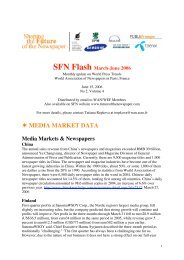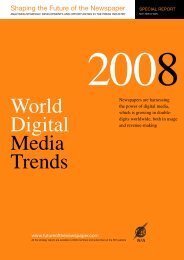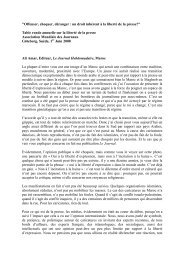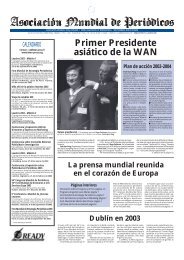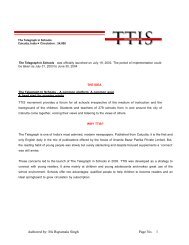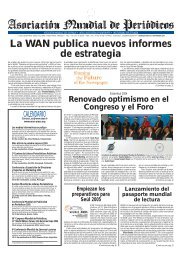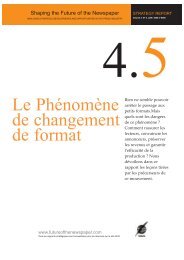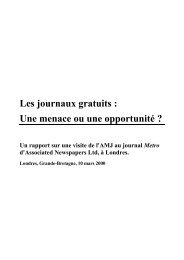WORLD PRESS TRENDS - World Association of Newspapers
WORLD PRESS TRENDS - World Association of Newspapers
WORLD PRESS TRENDS - World Association of Newspapers
Create successful ePaper yourself
Turn your PDF publications into a flip-book with our unique Google optimized e-Paper software.
MEXICO<br />
Commentary - El Universal<br />
The availability <strong>of</strong> public information on Mexican media is a<br />
constant problem. There are no <strong>of</strong>ficial reports or private<br />
companies that report regularly on the media, only isolated<br />
efforts by some institutions and academics. With this in mind,<br />
we will elaborate on the crisis that hit the Mexican media hard<br />
in 2002, with resounding effects today.<br />
The causes <strong>of</strong> this crisis lie in the contraction <strong>of</strong> the domestic<br />
market. This contraction was due to the recession in the US;<br />
high dependence on a single customer, the government; and<br />
the government’s tendency to favour the electronic media.<br />
The press has <strong>of</strong>ten seemed more interested in spreading<br />
government propaganda than discharging its social<br />
responsibility to readers. After the political upheaval in 2000,<br />
when Vicente Fox Quesada rose to power, it became obvious<br />
that many in the media were going to face life-or-death<br />
upheavals.<br />
This first happened with one <strong>of</strong> the oldest newspapers in the<br />
country, Excélsior, when the Director was thrown out for trying<br />
to sell the paper behind the back <strong>of</strong> the cooperative that owned<br />
it. Since then, an internal dispute has ensued between two<br />
groups fighting the legal representatives <strong>of</strong> the Board <strong>of</strong><br />
Directors. Recently, a notorious former police chief <strong>of</strong>fered<br />
US$150 million <strong>of</strong> uncertain origin to take over Excélsior.<br />
Later, rival groups fought for control <strong>of</strong> the cooperative running<br />
the newspaper El Día. The struggle left the newspaper, once<br />
called “Spokesman for the People” by its founder, in a shambles.<br />
Novedades stopped its presses for the last time on 31st December<br />
2002, along with its English language paper, The News. Its assets<br />
were sold by its owner.<br />
Neck high in problems, the owners <strong>of</strong> El Heraldo sold part <strong>of</strong><br />
their shares to Telmex, owned by the entrepreneur Carlos Slim.<br />
Unomásuno, once a groundbreaking independent newspaper,<br />
was turned into a pamphlet for the PRI party when it was in<br />
power. After the election turmoil, which ended in defeat for<br />
the PRI, the paper closed and its owner, a former PRI party<br />
<strong>of</strong>ficial, sold it to a businessman who is now facing legal action<br />
for abusing worker’s rights, and a scandal over the ambiguous<br />
source <strong>of</strong> his fortune.<br />
México Hoy closed its doors and its equipment and facilities were<br />
sold to property developers in Cancun.<br />
These cases are but examples <strong>of</strong> the readjustment currently in<br />
progress in the Mexico City newspaper industry. The change<br />
<strong>of</strong> government and the old relationship between the media and<br />
the state has had the most pr<strong>of</strong>ound consequences for Mexico<br />
City.<br />
Mexico City, with 30 newspapers, must have one <strong>of</strong> the highest<br />
numbers <strong>of</strong> newspapers <strong>of</strong> any city in the world. This is where<br />
the crisis has hit hardest. Without government advertising,<br />
without an entrepreneurial drive and without readers (the<br />
highest print run by a Mexico City newspaper is lower than<br />
200,000), the city papers face a tough future. This has led to job<br />
losses. Since early 2002 scores <strong>of</strong> journalists have been fired from<br />
newspapers and magazines (no precise number is available).<br />
Journalists have also been subject to strong pressure from the<br />
government. That resulted in subpoenas to reporters from El<br />
Universal and La Jornada, to reveal their sources <strong>of</strong> information<br />
on corruption among politicians and <strong>of</strong>ficials.<br />
Another problem for journalism is that Mexico has a loophole<br />
in its legal framework limiting the free exercise <strong>of</strong> journalism<br />
and the service it provides society. Reforms are needed to move<br />
defamation proceedings from criminal courts to civil courts.<br />
This is especially true when the plaintiff is a public <strong>of</strong>ficial, and<br />
is already common practice in other parts <strong>of</strong> the world, including<br />
several nations in Latin America.<br />
In June 2002 the Federal Act on Transparency and Public Access<br />
to Government Information was passed. The general objective<br />
<strong>of</strong> this law is to allow anyone access to information possessed<br />
by the government.<br />
Also in 2002, the National Press Award Council was formed to<br />
choose and give the National Press Award, absolutely<br />
independently from the government. The Council is formed<br />
by journalists, civil associations and universities.<br />
POPULATION<br />
Population by age and sex<br />
All individuals Male Female Households<br />
000 % 000 % 000 % 000<br />
0-15 24,219 23 11,930 23 12,289 23 22,269<br />
16-24 13,559 13 6,679 13 6,880 13<br />
25-34 23,082 22 11,370 22 11,712 22<br />
35-44 23,184 22 11,419 22 11,765 22<br />
45-54 9,523 9 4,691 9 4,832 9<br />
55-64 9,833 10 4,843 10 4,990 10<br />
Total 103,400 100 50,932 100 52,468 100<br />
Source: INEGI, CIA<br />
Age structure <strong>of</strong> readership<br />
% <strong>of</strong> % daily reach<br />
Age readership within age group<br />
6-15 8.0 4.3<br />
16-24 23.5 12.6<br />
25-34 27.0 16.4<br />
35-44 20.6 17.5<br />
45-54 12.2 16.9<br />
55-64 7.5 18.2<br />
65+ 1.2 21.7<br />
Source: Ipsos Bimsa<br />
<strong>WORLD</strong> ASSOCIATION OF NEWSPAPERS - <strong>WORLD</strong> <strong>PRESS</strong> <strong>TRENDS</strong> 2003 191





